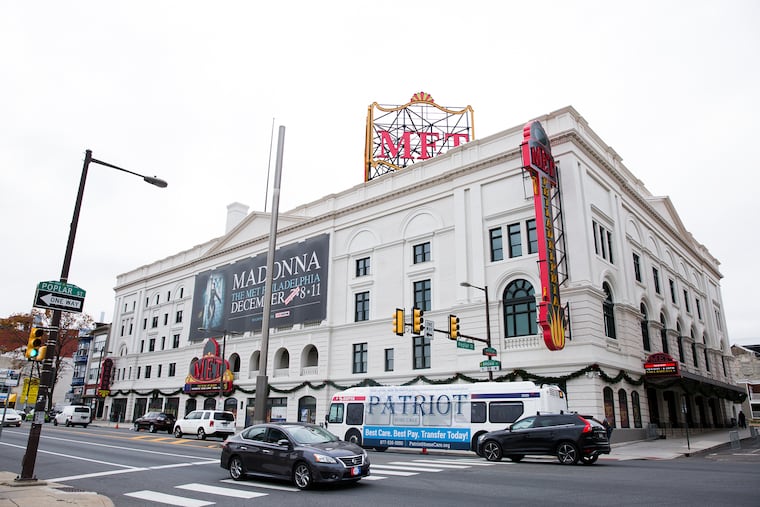Live Nation ‘bullied’ church, pocketed Met landlord’s share of cash from Madonna, Sting shows, lawsuit says
The suit, which could add to the company’s legal woes, lays bare apparently long-simmering tensions between the promoter and its landlord at the concert venue.

Live Nation is accused in a lawsuit of cheating its landlord at the Met Philadelphia out of proceeds from performances by artists such as Madonna and Sting, and breaking an agreement to let the church that previously owned the music hall continue holding Sunday services there.
The lawsuit was filed late last week in Common Pleas Court by Holy Ghost Met Master Tenant LLC, an affiliate of developer Eric Blumenfeld, and Holy Ghost Church, the nondenominational congregation that solely owned the North Broad Street property before teaming with Blumenfeld to restore it into a $58 million concert venue.
It accuses Live Nation Entertainment Inc. and its regional president, Geoffrey S. Gordon, of breach of contract, unjust enrichment, and other offenses, seeking unspecified monetary damages.
The promoter already was anticipating legal woes. The Wall Street Journal reported last week that the Justice Department is preparing to act on allegations that it has sought to pressure venues owned by others into using its Ticketmaster subsidiary.
The suit lays bare apparently long-simmering tensions between Live Nation and its landlord at the concert venue near the Girard station on the Broad Street Line, even as the hall has enlivened Philadelphia’s performing arts scene and helped reinvigorate its neighborhood.
Live Nation and its regional leaders have “treated the Met as if it was the owner and developer of the building, disregarding plaintiffs’ rights,” lawyers for Blumenfeld and the church say in the suit. “In the process, Live Nation has and continues to breach its contractual obligations.”
The Rev. Mark Hatcher, the church’s head pastor, wrote in a letter included with the lawsuit that Live Nation staffers have “created an environment of ‘bullying’ that is not in any way consistent with the arrangement that was agreed to by us.”
Christopher R. Cordaro, a vice president with Blumenfeld EB Realty Management Corp., had no immediate comment on the suit. Neither Hatcher nor Live Nation responded to requests for comment.
The Metropolitan Opera House was built in 1908 by impresario Oscar Hammerstein as a hoped-for North Broad Street counterpoint to the Academy of Music south of City Hall. By the mid-1990s, it had fallen into such disrepair that it was used as a backdrop in the post-apocalyptic thriller 12 Monkeys.
Hatcher, who bought the building around that time after holding services within its decaying walls for decades, teamed with Blumenfeld in 2013 on the renovation, with the developer acquiring a controlling stake in the property.
Blumenfeld’s other projects in the area have included the conversion of the abandoned Divine Lorraine Hotel into apartments and the Mural Lofts development in the old Thaddeus Stevens School.
In Live Nation’s April 2017 lease for the Met, the Beverly Hills-based company agreed to pay $1.5 million a year in “fixed minimum rent,” plus at least $2 for every ticket sold for events at the venue, according to the lawsuit. It also agreed to pay the landlord half of its proceeds from corporate sponsorships of performances.
Additionally, it said it would leave the music hall in a “clean and orderly condition for the church’s use” by 7 a.m. each Sunday and would make the space available for community events when no performances are scheduled.
In their complaint, Blumenfeld and the church accused Live Nation of breaking those vows and others.
The concert promoter shirked its commitment to pay Blumenfeld additional rent for each ticket sold by defining some performances — including ones by Madonna, Sting, Phish, and Little Big Town — as “private" or “licensing agreement events” that don’t qualify for the charge, according to the complaint.
Gordon, the regional president, also deprived Blumenfeld of ticket revenue by claiming “a significant number” of seats for himself to distribute, according to the lawsuit. While the suit does not specify how many tickets Gordon had claimed, it says they were believed to “have a value of approximately $3 million.”
Meanwhile, Live Nation has not paid Blumenfeld its share of revenue from companies with sponsorship deals at the venue, which have included Citicorp Credit Services Inc., Coca-Cola Co., and Red Bull North America Inc., according to the suit.
Live Nation has “represented” that it has earned $860,000 from those deals, but that amount is thought to be “substantially understated and misrepresented,” the complaint alleges.
Live Nation is also accused in the complaint of “trampling upon Holy Ghost Church’s right to use the Met for religious activities ... and otherwise treating the church and its congregation disrespectfully.”
At times, Live Nation has failed to open the venue in time for Sunday morning services, has forced the church to hold services in the dark by not turning on the electricity, and has improperly charged the church fees for services that were not requested or required, according to the complaint.
Live Nation has also prevented the church from hosting such local events as a barbershop-quartet competition featuring local performers and a graduation ceremony for Central High School, the complaint alleges.
“I have been asked several times to have church in the lobby due to Live Nation planning events during the agreed time of my Sunday morning services,” Hatcher wrote in his letter accompanying the suit. “The staff of Live Nation for some reason treats my staff as if they are nobody and Live Nation owns the building.”
Live Nation’s other Philadelphia-area venues include the Fillmore in Fishtown, the Theatre of the Living Arts on South Street, and the Tower Theater in Upper Darby.